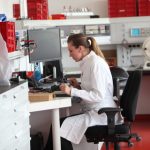
Manchester Molecular Pathology Innovation Centre announces strategic collaboration with Singulex
The University of Manchester has announced a strategic collaboration with US company Singulex, a leader in the use of single molecule counting technology as a diagnostic tool (The University of Manchester, 2016). Singulex has installed its SMCTM powered Sgx ClarityTM System in the Manchester Molecular Pathology Innovation Centre (MMPathIC) labs as part of its ongoing … Continue reading Manchester Molecular Pathology Innovation Centre announces strategic collaboration with Singulex

Genetics links sleep disturbance with restless leg syndrome, schizophrenia and obesity
A team of American and British scientists have discovered genetic connections between sleep disturbance and a range of medical disorders including obesity (The University of Manchester, 2016). Lead author Dr Jacqueline Lane, postdoctoral fellow at Massachusetts General Hospital (MGH) and joint senior authors Richa Saxena, Assistant Professor of Anaesthesia at the MGH and Harvard Medical … Continue reading Genetics links sleep disturbance with restless leg syndrome, schizophrenia and obesity

Laser treatment prostate cancer is a potential game changer
Scientists at University College London have made what they believe is a real breakthrough for prostate cancer, long seen as the Cinderella of cancers, using a drug derived from bacteria found at the bottom of the sea, injected into the bloodstream and activated in the prostate by laser beams (The Guardian, 2016). The treatment has … Continue reading Laser treatment prostate cancer is a potential game changer

Sure Chill signs deal with Dubai Electricity and Water Authority
Cardiff-based technology firm Sure Chill has signed a deal with Dubai Electricity and Water Authority (Dewa) (WalesOnline, 2016). Sure Chill was one of thirty companies selected to take part in the Dubai Future Accelerators programme. The Dubai Government-backed initiative ran for twelve weeks, with companies selected from 2,274 entries. After completing the programme Sure Chill … Continue reading Sure Chill signs deal with Dubai Electricity and Water Authority

Further evidence found for causal links between cannabis and schizophrenia
A study by the University of Bristol’s School of Experimental Psychology has found people with a greater risk of developing schizophrenia are more likely to try cannabis (University of Bristol, 2016). Earlier this year scientists warned about the increased risk of psychosis for vulnerable people who use cannabis. Their warnings followed evidence suggesting an increased … Continue reading Further evidence found for causal links between cannabis and schizophrenia

Cardiff University developing low-cost tool for dementia assessment
Cardiff University has been awarded around half a million pounds to develop a low-cost cognitive tool for dementia assessment in low and middle income countries (LMICs) (Cardiff University, 2016). Expanding on existing work at Cardiff University and the University of California, San Francisco, the new project will generate novel tablet-based tools for dementia diagnosis, in … Continue reading Cardiff University developing low-cost tool for dementia assessment

MedaPhor and SonoSim make patent infringement agreement
MedaPhor Limited and MedaPhor North America Inc. has announced today that MedaPhor and SonoSim Inc. and The Regents of the University of California have reached an agreement in principle on a patent licence and patent infringement settlement (MedaPhor, 2016). As a result, the parties will proceed to formalise their agreement in writing, following which the … Continue reading MedaPhor and SonoSim make patent infringement agreement

Researchers find ageing is reversible in mice
New research suggests it is possible to slow or even reverse ageing, at least in mice, by undoing changes in gene activity, the same kinds of changes that are caused by decades of life in humans (Scientific American, 2016). By tweaking genes that turn adult cells back into embryonic-like ones, researchers at the Salk Institute … Continue reading Researchers find ageing is reversible in mice

Scientists trial a living bandage for knee injuries
A living bandage made from stem cells, which could revolutionise the treatment and prognosis of meniscal tears, a common sporting knee injury, has been trialled in humans for the first time by scientists at the Universities of Bristol and Liverpool (University of Bristol, 2016). Meniscal tears are suffered by over one million people a year … Continue reading Scientists trial a living bandage for knee injuries

Magstim announces new distribution partnership in the Netherlands
Magstim has announced a new partnership with Neurostim, a distributor based in Enschede in the Netherlands. The partnership involves the exclusive distribution of the Magstim TMS product range (Magstim, 2016). Neurostim has over thirteen years experience in medical device sales and marketing. The business development company focuses on the medical and technical area, and has … Continue reading Magstim announces new distribution partnership in the Netherlands








